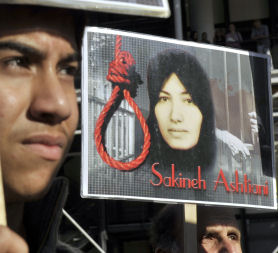Iran stoning film highlights ‘barbaric’ punishment
As a new film is released about a woman stoned to death in Iran, its director tells Channel 4 News why he hopes it becomes a call to action to help Sakineh Mohammadi Ashtiani

Sakineh Mohammadi Ashtiani was arrested in 2006 for adultery and being an accomplice to the murder of her husband.
Her punishment was execution by stoning or hanging.
The Iranian Embassy told Channel 4 News in July that Sakineh Mohammadi Ashtiani will not face death by stoning but Amnesty International says her punishment is currently being reviewed and has not been overturned.
Earlier this week one of her lawyers is thought to have been arrested in Iran along with Sakineh’s son who has been campaigning on her behalf.
Stoning is something beyond most people’s comprehension and the idea that it’s going on today is pretty shocking. Film director Cyrus Nowrasteh
Her plight has made headlines around the world. Now a film, about stoning in Iran, has been dedicated to Sakineh.
“The stoning of Soraya M” is a true story about a young woman, Soraya, who is executed by stoning. Her aunt then risks her own life by telling a visiting journalist what has happened to her niece in the hope the world will find out.
- Chapters
- descriptions off, selected
- subtitles off, selected
- captions settings, opens captions settings dialog
- captions off, selected
This is a modal window.
This is a modal window. This modal can be closed by pressing the Escape key or activating the close button.
It is directed by Cyrus Nowrasteh. He lived in Iran as a child and told Channel 4 News he hoped the film would raise awareness of Sakineh’s case: “Stoning is something beyond most people’s comprehension and the idea that it’s going on today is pretty shocking…I felt that people needed to be aware of this.
“I hope this film helps that cause and the cause of trying to end these kinds of barbaric punishments which is the only way to describe them.”
The film has been described by Amnesty International as shocking and powerful.
The Iranian penal code actually sets out that the stones must be small enough not to cause death immediately but large enough to cause harm. Amnesty International
Cyrus Nowrasteh told Channel 4 News he wanted to depict an accurate account of stoning: “This is a very uncompromising approach to telling this story. I felt a certain responsibility towards the many, many victims of stoning.
“I’ve seen footage of stonings and I felt like to sanitise this story, to clean it up, to make it safer for people to watch would be somewhat irresponsible. By the same token you can’t be so graphic people are running out of the theatre. We tried to find a delicate balance so when people see this movie they know how a stoning takes place.”
Amnesty International says there are ten women and four men currently facing stoning in Iran.
The charity’s spokesman Steve Ballinger told Channel 4 News that international pressure on Iran must continue: “Stoning is a disgusting punishment and the Iranian penal code actually sets out that the stones must small enough not to cause death immediately but large enough to cause harm.
“It’s a deliberately cruel, inhumane and degrading punishment.”
Read more reports about Iran on our special report page – Iran: inside the Islamic state